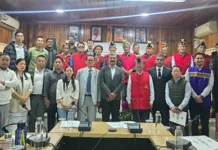Monday Musing
[ Junroi Mamai ]
As per recent Swachh Survekshan 2020 results, Itanagar, the capital of Arunachal has been ranked 7th among the 10 dirtiest cities of the country in the category of below 10 lakh population.
It is disappointing to note that our state capital is included in the list of dirtiest cities by a national survey but sadly, it is not for the first time that our state capital has been mentioned in the list. Earlier, Itanagar was also listed as the third dirtiest city in the country during the ‘Swachh Survekshan 2016. Though this year, the state capital’s rankings have differed from that of 2016, it certainly cannot be considered an improvement that we could be proud of.
The state government has taken various initiatives under the Swachh Bharat Mission, the country-wide campaign by the govt. of India which aims at eliminating open defecation and improving solid waste management and there have been some positive developments in various parts of the states. However, we still need a lot to do in order to achieve the status of a clean and garbage-free state.
It requires the collective efforts of both the people and the state government to ensure that our villages, towns and cities remain clean. Most essentially there is a need for bringing a behavioural change among our people about maintaining cleanliness not only around their own houses but in their locality and town also. We need to extend our support to the government departments engaged in sanitation and garbage collection work and cooperate with them.
Also, there is need for proper waste management in our state because the department is focussing only on collecting and dumping the tonnes of garbage out of city limits, which is not the best solution to the problem. The only solid waste management plant in Itanagar is at Chimpu, which is also defunct since a very long time. Moreover, there is no segregation of waste during collection and disposing of solid wastes. No separate dustbins for biodegradable and non-biodegradable wastes are placed anywhere in the sectors and colonies. People put all their garbage into polybags and throw it into the dustbin which would later be collected by the sanitation workers. Authorities are technically dumping the garbage away from the population; they are not disposing it properly as it should be.
What the state needs is a concrete policy to address this important issue otherwise all of these efforts are futile exercises which would only worsen the already unsystematic solid waste management situation. The focus should be on long-term solution to the sanitation and garbage disposal problem that too, in an environment friendly manner.
Not only should more awareness be created among people, the state government should take stringent steps to make littering in and around the village, towns and cities a punishable offence. The state government could pass a bill in the state assembly regarding this important issue and make it mandatory for all government departments and individuals to ensure that sanitation is maintained, be it private residences, govt. offices, business establishments or public places. State needs to implement stringent laws which would make littering a punishable act and penalize those involved in such activities to help maintain cleanliness in our state.



